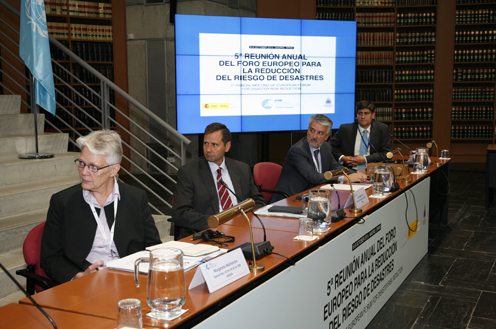The technical work sessions will take place on 6-8 October, at which representatives of European countries and various national and international institutions and bodies will take part - including the United Nations, the Council of Europe and the European Commission - that are members of the forum and which are responsible for minimising the consequences of natural disasters and reducing the vulnerability of populations and communities.
This meeting represents an opportunity for the exchange of experiences and lessons learned by all of the participants, which will culminate with a joint declaration entitled the "Declaration of Madrid", which will contain the general lines of its contribution to the new post-2015 framework, which will be drawn up at the Third World Conference on Disaster Risk Reduction to be held in Sendai (Japan), on 14-18 March next year. Risk reduction is only possible when players at all levels take on a shared commitment on behalf of civil society.
As the country chairing the forum, Spain will preside over the development of the technical sessions, which will be based on three main principles:
- Adaptation to climate change
- Governance and responsibility
- Implementation of the Hyogo Framework for Action, subscribed by 168 countries, to strengthen the response to natural disasters and improve risk knowledge.
Background in Hyogo Framework for Action
This forum is held within the framework of the United Nations, through the International Strategy for Disaster Reduction, which has its background in the World Conference on the matter, held in January 2005, at which the Hyogo Framework for Action was adopted.
This Framework for Action was drawn up in the context of the International Decade for Natural Disaster Reduction (1990-1999) and was articulated in various strategies and plans, including the International Strategy for Disaster Reduction 1999, which constitutes the most extensive framework of reference by the United Nations on the matter. Its main aims are to:
- Adapt the institutional, legal and regulatory framework of the various States, regional organisations and international institutions.
- Identify and evaluate the risks, and step up the early warning system.
- Manage knowledge and education to create preventive culture.
- Reduce risk factors and improve preparation for disasters with aim of ensuring effective response.
Damir Čemerin prize for Lorca Town Council
Upon a proposal from the Directorate General for Civil Protection and Emergencies of the Spanish Ministry of Home Affairs, Lorca Town Council has been presented with the Damir Čemerin Award for Local Change, instituted by the National Civil Protection Service of Croatia.
This acknowledges the measures adopted by the municipality to improve the quality of life of elderly people and their resilience to the disaster in 2011, in other words, their ability to overcome the effects of the earthquake.
The Mayor of Lorca, Francisco Jódar, received the commemorative diploma and expressed his gratitude for the award granted to this population on behalf of all their citizens who showed so much courage and solidarity in moving forward following the disaster.
Awards were granted in previous editions to a Croatian teacher for his work to raise awareness about children with special needs, to whom it was necessary to explain the nature of disasters, due to their special vulnerability, and a researcher from an International Centre for Climate and Environment Research in Oslo, for his work in tying in disaster risk reduction to climate change.





